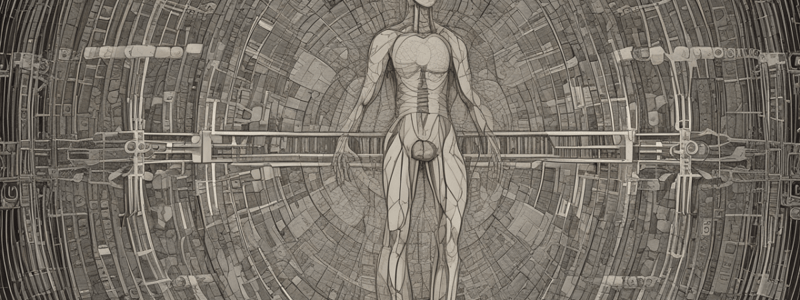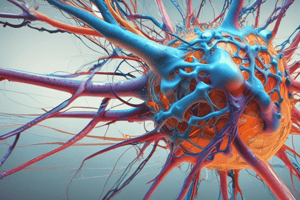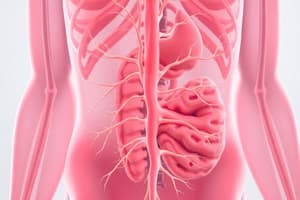Podcast
Questions and Answers
What is the primary function of the reflex mentioned in the content?
What is the primary function of the reflex mentioned in the content?
- To control rhythmic motor activity
- To facilitate locomotion
- To prevent an animal from falling to one side (correct)
- To regulate breathing
What are Central Pattern Generators (CPGs) primarily responsible for controlling?
What are Central Pattern Generators (CPGs) primarily responsible for controlling?
- Rhythmic motor activity (correct)
- Voluntary motor activity
- Posture maintenance
- Sensory input integration
Where are the control centers that initiate and terminate rhythmical activity located?
Where are the control centers that initiate and terminate rhythmical activity located?
- Cerebellum
- Cerebrum
- Brainstem (correct)
- Spinal cord
What type of neurons are found in Central Pattern Generators (CPGs)?
What type of neurons are found in Central Pattern Generators (CPGs)?
What is the primary function of the cerebellum in movement?
What is the primary function of the cerebellum in movement?
What is required for normal, coordinated movement?
What is required for normal, coordinated movement?
What type of receptors provide sensory input for reflexes?
What type of receptors provide sensory input for reflexes?
In which part of the spinal cord are the CPGs associated with locomotion and scratching located?
In which part of the spinal cord are the CPGs associated with locomotion and scratching located?
What is the primary function of the motor cortex in voluntary movement?
What is the primary function of the motor cortex in voluntary movement?
Which level of the CNS is responsible for coordinating movements with changes in posture?
Which level of the CNS is responsible for coordinating movements with changes in posture?
What is the role of higher-order areas in the CNS?
What is the role of higher-order areas in the CNS?
What is the benefit of having a hierarchical organization in the SMS?
What is the benefit of having a hierarchical organization in the SMS?
What is the role of the basal nuclei in the SMS?
What is the role of the basal nuclei in the SMS?
What is the function of the spinal cord in the SMS?
What is the function of the spinal cord in the SMS?
What is the advantage of having voluntary movements initiated by the cerebral cortex?
What is the advantage of having voluntary movements initiated by the cerebral cortex?
What is the benefit of having a hierarchical organization in the CNS?
What is the benefit of having a hierarchical organization in the CNS?
Which tract is responsible for controlling distal limb musculature associated with movement?
Which tract is responsible for controlling distal limb musculature associated with movement?
Which of the following tracts is involved in reflex orientation of the head toward environmental stimuli?
Which of the following tracts is involved in reflex orientation of the head toward environmental stimuli?
Which tract receives significant input from the Cerebellum to synchronize muscle activity?
Which tract receives significant input from the Cerebellum to synchronize muscle activity?
Which tracts are located in the ventral funiculus of the cord?
Which tracts are located in the ventral funiculus of the cord?
What is the main function of Central Pattern Generators?
What is the main function of Central Pattern Generators?
Which tract is involved in the control of postural and antigravity activity of proximal and axial musculature?
Which tract is involved in the control of postural and antigravity activity of proximal and axial musculature?
Which tracts are facilitatory to flexor muscles and inhibitory to extensors?
Which tracts are facilitatory to flexor muscles and inhibitory to extensors?
What is the primary function of the Tectospinal Tract?
What is the primary function of the Tectospinal Tract?
Which tract is involved in the initiation of protraction (forward movement) of the limbs in gait?
Which tract is involved in the initiation of protraction (forward movement) of the limbs in gait?
What is the role of the spinal cord in movement control?
What is the role of the spinal cord in movement control?
Flashcards are hidden until you start studying
Study Notes
Control of Visceral Motor Function (ANS)
- All movement ultimately results from excitation or relaxation of muscles.
- Voluntary movements are initiated consciously but are coordinated at a more subcortical level of the brain.
Hierarchical Organization of SMS
- Motor cortexes
- Basal nuclei
- Thalamus
- Cerebellum
- Brainstem
- Spinal cord
- Peripheral nerves
Voluntary Movement and Primary Motor Cortex
- Voluntary movement is directed by the primary motor cortex.
- Most voluntary movements are achieved when the cortex activates patterns of function stored in lower CNS areas.
Organization of Complex and Skilled Patterns
- Higher-order areas concern themselves with global tasks regarding action, such as deciding when to act, planning an appropriate sequence of actions, and coordinating the activity of many limbs.
- Lower-order areas perform low-level tasks, such as programming the exact force and velocity of individual muscles, or coordinating movements with changes in posture.
Reflexes and Central Pattern Generators (CPGs)
- Reflexes involve complex circuits in interneurons, such as the flexor and crossed extensor reflexes.
- CPGs produce oscillatory outputs used for controlling rhythmical motor activity, such as locomotion, scratching, chewing, and breathing.
- CPGs associated with locomotion and scratching are in the spinal cord intumescences.
- Control centers that initiate and terminate the rhythmical activity are in the brainstem.
Sensory Input and Integration
- Sensory input for the reflexes comes from muscle spindles, Golgi tendon organs, joints, and tactile receptors.
- Integration of that input in the spinal cord causes inhibition or excitation of LMNs, as appropriate.
Cerebellum and Posture
- The cerebellum coordinates agonistic/antagonistic muscle activity to permit posture and to create movement that occurs at the correct rate, range, and force.
- The cerebellum coordinates overall posture by coordinating contraction-relaxation of all muscles in the body used for maintaining posture, both at rest and during movement.
Tectospinal Tract and Rubrospinal Tract
- The tectospinal tract is involved in reflex orientation of the head toward environmental stimuli and controls rapid reflex movement of the eyes.
- The rubrospinal tract is a lateral brainstem UMN pathway that controls distal limb musculature associated with movement, and is important for gait generation in quadrupeds.
Movement and Muscle Activity
- Movement can be divided into two general forms: dominated by flexor muscles (largely learned, voluntary, conscious, and skilled) and dominated by extensor muscles (postural, antigravity muscle activity, generally subconscious and involuntary).
- The control of these two types of movements is made by different neurons and tracts in the nervous system.
Lateral and Medial Systems
- Skilled voluntary movement of distal musculature (flexors) is primarily controlled by a lateral system (lateral funiculus) of lower and upper motor neurons' spinal tracts.
- Postural and antigravity activity of the proximal and axial musculature (extensors) is controlled by a more medial system (ventral funiculus) of such neurons and tracts.
Spinal Cord and Movement Control
- The spinal cord is the most caudal and simplest level of movement control.
- It contains the UMN tracts, alfa lower motor neurons, interneurons, and complex neural circuits for motor control.
- The spinal cord executes the low-level commands that generate proper forces on individual muscles groups to enable adaptive movements.
Studying That Suits You
Use AI to generate personalized quizzes and flashcards to suit your learning preferences.




